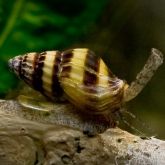Assassin snail

An assassin snail in aquarium
© RSX Creative Commons
Assassin snails that belong to the genus Anentome spp. and the genus Clea spp. are carnivorous snails that will prey upon native molluscs and worms if released into the Australian environment.
No native carnivorous freshwater snails exist in Australia; therefore, introducing this species would cause major harm to the biodiversity of our freshwater environments. Early detection helps protect Queensland's agricultural industries and natural environment.
Assassin snails are not on the permitted Australian Government Live Import List. They can't be imported into Australia or traded within Australia—this is an offence under the Environment Protection and Biodiversity Act 1999.
Scientific name
Anentome genus (recently re-described)—about 10 species
Assassin snails were most recently referred to as Anentome helena; however, recent studies indicate that assassin snails in aquarium trade may radiate from several species lineages from Vietnam, Thailand, Sumatra and Malaysia. For this reason, all species from the Clea and Anentome genuses are classed as biosecurity matter in Queensland.
Description
- Maximum length is about 30mm but often found smaller as the top of shell wears away in older individuals.
- Shell has characteristic brown and olive-green or orange stripes. Juveniles may be paler.
- Base of shell has an obvious notch from where the proboscis extrudes to feed.
- Egg capsules are clear and roughly square.
- Predator and scavenger: feed on worms, other gastropods and carrion; can predate on fish.
Habitat
- Live in tropical, freshwater lakes, reservoirs and rivers/streams.
- Prefer soft, muddy substrate, and may be among the dominant gastropod species in some locations.
- Under aquarium conditions, they tolerate all kinds of water chemistry but will die if not kept sufficiently warm, implying that they will not tolerate non-tropical conditions. Preferred water temperature is 22–28°C.
Distribution
- Assassin snails have a history as an invasive species in Cambodia and Singapore. Given their emerging popularity in home aquariums, evidence suggests that Clea spp. and Anentome spp. may become naturalised in suitable habitats and climate zones within Queensland if they escape from captivity or are dumped into suitable habitats.
- No native carnivorous freshwater gastropods are present in Australia; therefore, if introduced may cause significant harm to native biodiversity.
Life cycle
- Animal with separate sexes.
- Females lay several clear egg capsules.
- Each egg capsule contains a single egg.
- Egg capsules are generally laid on solid surfaces and at the base of plants.
Impacts
- Potential to become a serious invasive species by preying on native molluscs if introduced into natural environments in Australia.
Control
- If you think you have seen an assassin snail, report it to Biosecurity Queensland immediately on 13 25 23. Take reasonable and practical steps to prevent assassin snails from spreading until an authorised officer contacts you.
Legal requirements
- It is an offence to import or trade assassin snails in Australia under the Environment Protection and Biodiversity Act 1999. You must not sell or trade these snails on Gumtree, eBay, Facebook or any other marketplace.
Further information
- Contact the Customer Service Centre.
- Read the assassin snail fact sheet.
- Report a pest freshwater animal sighting.